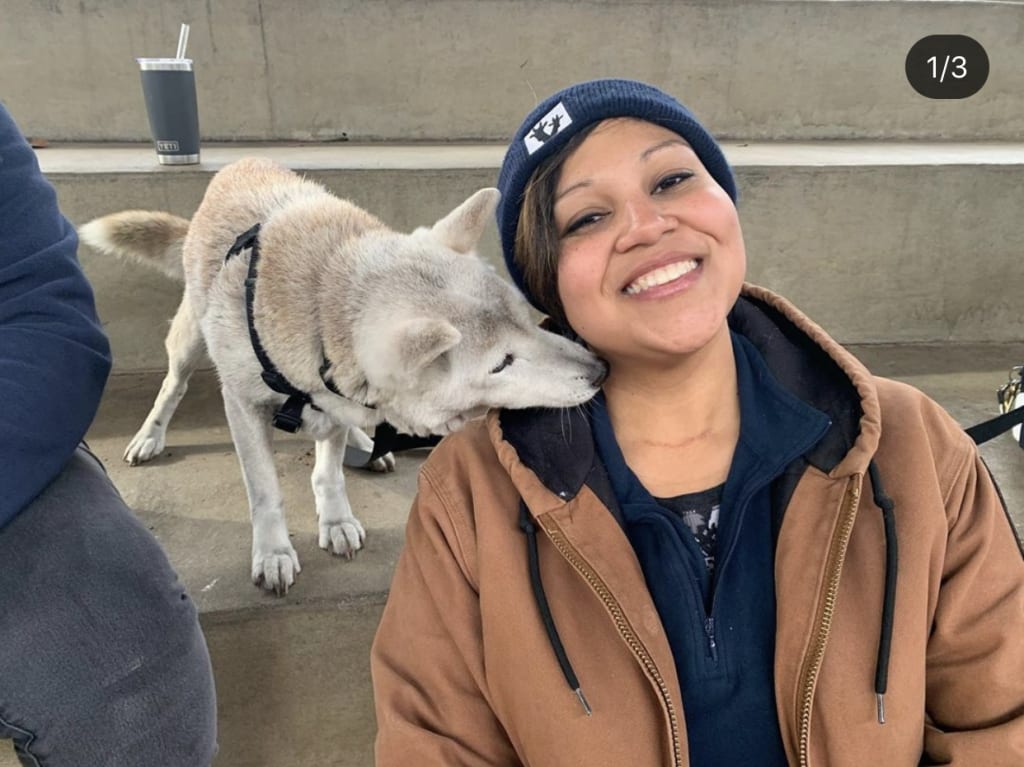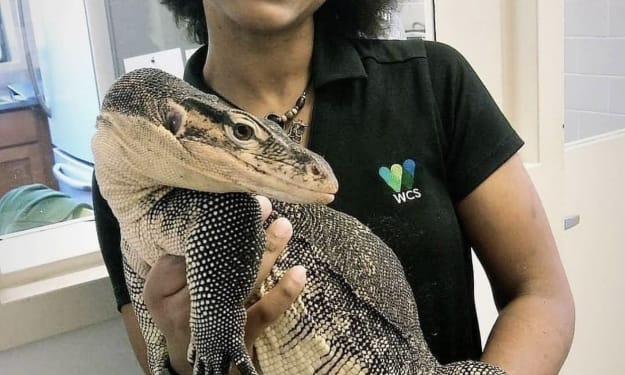The Real Queens of Wakanda II: Reach Out Through Education
Nashville-based Zookeeper Jawnie Payne reaches out to the public on wildlife and conservation through her work with the animals she loves, via, social media

“In the end, we will conserve only what we love; we will love only what we understand and we will understand only what we are taught.” - Baba Dioum
In my previous entry to the “Real Queens of Wakanda” series, I put the spotlight on Bronx Zoo’s Maya E.Stay and how her years of dedication to working with animals led to her eventually landing a job as a full-time keeper at the Children’s Zoo exhibit in 2015. Now, all focus will now be placed on a Nashville, Tennessee-based zookeeper of color and her undying will to inspire all children to know all the animals she works with.
Jawnie Payne, a zookeeper and wildlife educator who is based at the Nashville Zoo, is known for educating people on social media platforms about the various animals she works with by “touching the heart to teach the mind”. When I found her profile on Instagram, I knew that she would be one of the female zoo professionals of color that I had to give a voice to because I loved seeing all the photos and videos of her not just interacting with her animals, but also, educating people about them and showing them what it is like to work with these animals and ensuring their care.
When I found her profile on Instagram, I knew she would be one of the female zoo professionals of color who had to be featured in my series. I loved seeing all the photos and videos of her interacting with her animals and educating her viewers about her beloved animals and their care on Facebook and YouTube.
Here is my interview with the amazing Jawnie Payne.
1. JD: What made you want to work with animals in the first place?
JP: I’ve always been an animal lover. Like many kids that love animals and want to work with them, I thought I wanted to be a Veterinarian. When I was probably 13 I realized that vets need to put animals down and see some horrific stuff so I immediately decided against that. After that, even throughout school, I never really truly knew what I wanted to do until I went to the zoo and talked to a few girls after animal shows the summer between my junior and senior years of college.
2. JD: Have you done any volunteer and, or internship experiences during your high school and college years?
JP: I’ve always volunteered in different aspects, but nothing animal-related until I realized I wanted to work in the zoo. Once I changed my major and started working seasonally at the zoo, I got an internship working in the education department as an interpretive guide. After the internship was over, they asked me to stay on as a seasonal, which I did for 3 years before finally working with animals as a temporary school leader in the education department and then finally in the Animal Programs department where I got to care for the animals as well as work with them for programs. This was all at the Columbus Zoo; I was there for 5 years with all of those seasonal positions/internships.
I also volunteered at the Ohio Wildlife Center which is just around the corner from the zoo, for about 2 years.
3. JD: What is your favorite animal to work with?
JP: Right now my favorite animal to work with is Charlie, the Prehensile Tailed Porcupine. He’s an amazing animal that people generally don’t know exists and he’s one of the cutest animals at the zoo and I’ve been able to build a relationship with him as his primary trainer over the past year. Overall, opossums have been one of my favorites to work with simply because they are a common animal, but most people don’t know anything about them. And at times, what they think they know, isn’t even true. They’re cute, I don’t care what anyone says ha-ha, they are not big rats, they’re marsupials, not rodents. They’re North America’s only marsupial. They don’t catch rabies or many other diseases, they rid the world of some diseases. They vacuum up thousands of ticks in just a few months and are not susceptible to lime diseases or Rocky Mountain Spotted Fever, reducing the chances of us or our pets catching any of those things. They’re also immune to snake venom! And love to eat snakes! (Coral snake venom is the exception)
4. JD: When did you land the position you have now?
JP: I started working here at the Nashville Zoo as an Outreach Keeper almost two years ago. That’s after my five years of seasonal work at the Columbus Zoo and three and a half years at the Fort Worth Zoo.
5. JD: What is it like for you to be a person of color to be part of the zoological community? Have you faced any challenges along the way?
JP: It’s interesting. I’m generally the only black or even brown person that’s a keeper at the zoos I work at. Some zoos, that meant, everyone knew who I was, especially zoo management that sometimes don’t necessarily know the names of keepers. At times I’ve even been requested for some programs because of the color of my skin. Which can go two ways? Either they’re trying to show they have diversity where there is none, or they’re trying to be progressive and hopefully being a part of “representation matters”. That’s important anywhere for anything, but it’s very understandable when it’s a field like mine, where it’s very rare to see a brown or black person. Sometimes if a friend or someone is filing something at the zoo, I’ll comment, “Hey, want to add some diversity?”.
Other than that, most of my experiences with this is with guests. I’ve gone places for a program where someone will wait to speak with one of my coworkers when I’m one of the upper-level keepers who sometimes have more experience than the other person. And at times they still have to refer that person to me. I’ve been talking with people about animals and afterward, they’ll say that they’re shocked, but delighted that I know so much about whatever animal it is and that I “speak so well”. Like, um ok, Bye. But then there are great days! This past year on several occasions he had parents bring their black or brown kids up and ask to get a picture with me because they don’t see people who look like me doing this sort of thing. But I also have parents bring their girls up, and ask every ethnicity, to get a picture with me because they don’t usually see a woman doing this sort of thing. Which that aspect is crazy. We all know many things or fields of work are male-dominated, but when it comes to zookeepers, it’s a woman-dominated field. BUT when you turn on the tv and watch shows or interviews with animal experts or zookeepers educating you on animals it’s men.
6. JD: What is one of your favorite moments on the job?
JP: My favorite moments are always when you see, not only a kid, but any age of a person, light up when they see an animal they’ve never seen before or even heard of before. It opens their eyes to a whole new world and then I get to tell them things to make them fall in love with this animal and tell them what they can do to help this animal in the wild. Back to the opossums, I love watching the light go off on someone’s brain when I talk about them. They’re just in awe of how amazing opossums are. A pouch on the stomach, they eat everything, immune to almost everything. They’re amazing.
7. JD: Last question, any advice for kids and teens who are looking into the possibility of working with animals in a zoological setting?
JP: Yes! There are always volunteer opportunities at your local zoo and sometimes a nearby wildlife center. Start by volunteering to get the experience, but to also figure out if that’s what you want to do. Pay attention in school and try to go to college for some sort of a 4-year life science degree. There are even a couple of schools out west that train you to be a zookeeper or animal trainer. Also, when you’re getting your experience in a zoo, try to stick with AZA (Association of Zoos & Aquariums) accredited Zoos. It will help you get a job at an amazing zoo one day. And don’t give up! It’s a competitive field to get into but it’s worth it! You get to care for animals, educate people about them, and work with an organization that’s saving these animals and their habitats in the wild!
A big thanks to Jawnie for joining Maya in sharing her story of being a woman of color in the zoological community and continuing to care for the animals who live under her care, and empowering others to know and love the animals she knows best. Once again, thank you so much for taking the time to answer these questions and giving yourself a voice in this amazing community.
If you are a woman of color and a member of the zoo and aquarium community and would like to share your story with me, email me at [email protected] or DM on Instagram at @jennacostadeedy.
Know more about Jawnie:
More in The Real Queens of Wakanda series:
About the Creator
Jenna Deedy
Zoo and Aquarium Professional, Educator, Cosplayer, Writer and B.A. in Psychology whose got a lot to share when it comes to animals, zoos, aquariums, conservation, and more.
Instagram: @jennacostadeedy






Comments
There are no comments for this story
Be the first to respond and start the conversation.